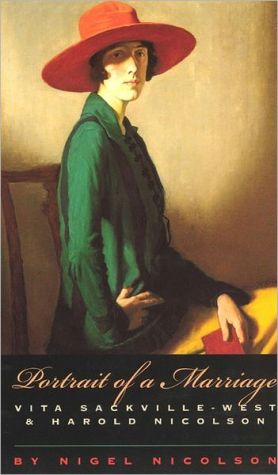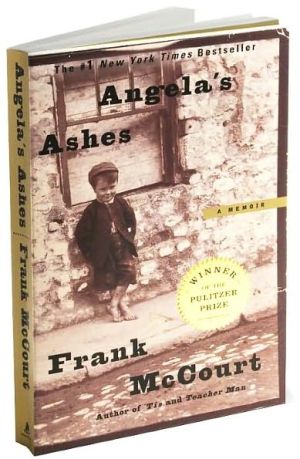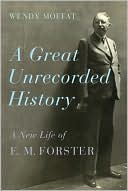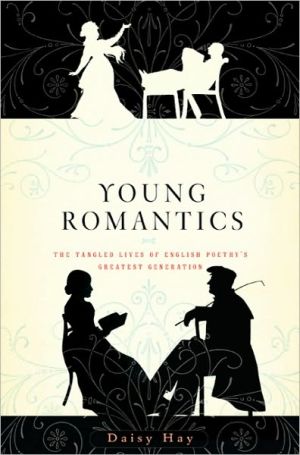Portrait of a Marriage: Vita Sackville-West & Harold Nicolson
Vita Sackville-West, novelist, poet, and biographer, is best known as the friend of Virginia Woolf, who transformed her into an androgynous time-traveler in Orlando. The story of Sackville-West's marriage to Harold Nicolson is one of intrigue and bewilderment. In Portrait of a Marriage, their son Nigel combines his mother's memoir with his own explanations and what he learned from their many letters. Even during her various love affairs with women, Vita maintained a loving marriage with...
Search in google:
Vita Sackville-West, novelist, poet, and biographer, is best known as the friend of Virginia Woolf, who transformed her into an androgynous time-traveler in Orlando. The story of Sackville-West's marriage to Harold Nicolson is one of intrigue and bewilderment. In Portrait of a Marriage, their son Nigel combines his mother's memoir with his own explanations and what he learned from their many letters. Even during her various love affairs with women, Vita maintained a loving marriage with Harold. Portrait of a Marriage presents an often misunderstood but always fascinating couple."Portrait of a Marriage is as close to a cry from the heart as anybody writing in English in our time has come, and it is a cry that, once heard, is not likely ever to be forgotten. . . . Unexpected and astonishing."—Brendan Gill, New Yorker"The charm of this book lies in the elegance of its narration, the taste with which their son has managed to convey the real, enduring quality of his parents' love for each other."—Doris Grumbach, New Republic Newsweek - Kenneth Auchincloss An extraordinary fine book: a candid view of a marriage that had every reason not to work and yet, through enormous compassion, respect, originality and luck, did work superbly well...Fascinating and so humane.
\ PORTRAIT OF A MARRIAGE\ \ \ \ By Nigel Nicolson \ The University of Chicago Press \ Copyright © 1973 \ \ Nigel Nicolson\ All right reserved. \ \ \ ISBN: 978-0-226-58357-0 \ \ \ \ \ Chapter One PART I by V. Sackville-West \ July 23rd, 1920\ Of course I have no right whatsoever to write down the truth about my life, involving as it naturally does the lives of so many other people, but I do so urged by a necessity of truth-telling, because there is no living soul who knows the complete truth; here, may be one who knows a section; and there, one who knows another section: but to the whole picture not one is initiated. Having written it down I shall be able to trust no one to read it; there is only one person in whom I have such utter confidence that I would give every line of this confession into his hands, knowing that after wading through this morass -for it is a morass, my life, a bog, a swamp, a deceitful country, with one bright patch in the middle, the patch that is unalterably his-I know that after wading through it all he would emerge holding his estimate of me steadfast. This would be the test of my confidence, from which I would not shrink. I would not give it to her-perilous touchstone!, who even in these first score of lines should teach me where truth lies. I do know where it lies, but have no strength to grasp it; here am I already in the middle of my infirmities.\ I start writing, having spent no consideration upon this task. Shall I ever complete it? and under what circumstances?, begun as it is, in the margin between a wood and a ripe corn-field, with the faint shadows of grasses and ears of corn falling across my page. Unkernelled nuts hang behind me, along the fringe of the wood; I lie on green bracken, amongst little yellow and magenta wild-flowers whose names I don't know. I lie so close to the ground that my only view is of tall corn, so crisp that in the breeze it stirs with a noise like the rustle of silk. All day I have been in a black temper, but that is soothed away. There is no place, out here, for temper or personality. There is only one personality present: Demeter.\ Yesterday I was on the sea in a sailing-boat; it was very rough, and at moments I was extremely frightened, but I wished I wasn't frightened, because theoretically I enjoyed seeing the ship put her nose down into the waves, seeing the spray break over the deck, and then feeling my face all wet and tasting the salt water on my lips. The world of the sea is quite a different world. There is a whole different set of noises-the wash of the waves, the wind in the rigging, the banging of the blocks, the shouts of the crew-and one has a whole different set of wishes and pre-occupations-the wish that the boat would keep still, if only for five minutes, as a rest from the perpetual balancing; the pre-occupation as to whether the wind will get up, or go down, whichever it is; the immense, the overwhelming importance of weather, both as regards one's comfort and one's progress.\ I realize that this confession, autobiography, whatever I may call it, must necessarily have for its outstanding fault a lack of all proportion. I have got to trust to a very uncertain memory, and whereas the present bulks enormous, the past is misty. I can't remember much about my. childhood, except that I had very long legs and very straight hair, over which Mother used to hurt my feelings and say she couldn't bear to look at me because I was so ugly. I know that I wasn't a physical coward in those days, because I can remember doing dangerous things on a bicycle and climbing high trees-and yet, stop, I do believe I must have been a coward already, because I can remember thinking a great deal about whether I should be brave the next day when I went out riding, and I was too much fascinated by seeing other people do things which I knew I shouldn't dare to do myself. I never realized this until this moment. Anyway, I wasn't so much of a coward, and I kept my nerves under control, and made a great ideal of being hardy, and as like a boy as possible. I know I was cruel to other children, because I remember stuffing their nostrils with putty and beating a little boy with stinging-nettles, and I lost nearly all my friends in that kind of way, until none of the local children would come to tea with me except those who had acted as my allies and lieutenants.\ I don't remember much more about myself as a child than that. I remember more about outside things. I don't remember either my father or mother very vividly at that time, except that Dada used to take me for terribly long walks and talk to me about science, principally Darwin, and I liked him a great deal better than Mother, of whose quick temper I was frightened. I don't even remember thinking her pretty, which she must have been-lovely, even. My impression of her was that I couldn't be rough when she was there, or naughty, and so it was really a great relief when she went away. I remember very vividly terrible scenes between her and Dada-at least, she made the scene, he usually said nothing at all, or very mildly, "Oh, come, dear, is that quite accurate?" Her statements rarely were accurate; I realized this very, very slowly, but was incredibly obtuse over it; in fact I didn't really grasp it until a comparatively short time ago. (Evening is coming on, and I shall soon have to stop writing; thank God I am alone tonight. )\ When she and Dada went away, I was left alone with Grandpapa. He was very old, and queer, and silent. He hated people, and never spoke to the people who came to the house [Knole]; in fact, if he got the chance he used to go to London for the day when he knew people were coming, and I used to be left alone to entertain them. It amused me later on, when sometimes I was had downstairs to make fourteen, to see him sitting quite mute between two wretched women who were trying to make conversation to him, or else crushing them into silence: "You have lovely gardens here, Lord Northwood [Sackville]." "What do you know about gardens?" he would snap at them. But at the same time he was always shrewd in his estimate of people, and never liked those who were not worthy of liking, or disliked those that were. Mother used to get furious when in about six words he demolished her friends, but Dada used to laugh, and then she turned on him. But I suppose she was really very devoted to Grandpapa, in her own way, because underneath everything her ideas of duty are sound, and although the most incomprehensible, she is certainly the most charming, person upon earth, whom I adore.\ Grandpapa liked children and believed in fairies. Every night after dinner he used to fill a plate with fruit and put it ready for me to fetch early next morning; he used to put it in a drawer in his sitting-room, labelled Diana's [Vita's] Drawer, in very elaborate lettering in coloured chalks that he had done himself. He always amused himself in shy, secret ways like that; he used to spend hours whittling little bits of wood into queer shapes, and polishing them with sandpaper till the surface was like velvet, and he had a set of little remarks that he invariably made when the occasion turned up: "Nice fresh taste," he used to say over the first asparagus; and "Poor old Cox," whenever anything went wrong with anybody; but I never discovered the origin of that. To go back to the fruit, it was a regular ritual, which nothing would have induced him to forego and which I never knew him to forget, even, poor old man, at the beginning of his last illness, while he was still downstairs; even if there were twenty people to dinner he heaped the plate for me just the same and carried it to the drawer, and if ever I forgot to fetch it in the morning he would make a grievance that lasted until it turned into a joke, and so became mellow instead of bitter.\ In the same way he minded very much if I didn't go down to his room after tea and play draughts with him. It upset his habits, and also I think he must have been fond of me; he liked having children in the house, and later on he liked Charles [Edward Sackville-West], who was my cousin ten years younger than I, and was a genius, and could play Wagner when he was four. (He was very delicate, always passing from critical illness to critical illness, so that he was always brought downstairs wrapped in an enormous white Shetland shawl, in which he sat at the piano, with his puny little legs dangling, as unable to touch the pedals as his tiny hands were to span an octave.) Grandpapa liked children and he liked flowers, but he didn't care a rap about the house, and when people asked him questions about it, or about the pictures or silver or furniture, he used to refer them to Mother.\ Mother made all the capital she could out of the house; to hear her talk about it you would have thought she had built it, but she had no real sense of its dignity, as Dada had, who worshipped it in his bones, but would sooner die than say so. I think it must have been very hard for him then, living in the house as Grandpapa's heir, but being only the nephew, not the son, and having no word to say in the management either of the house, the gardens, or the estate, and hearing Mother make up legends about the place, quite unwarrantable and unnecessary-the place was quite good enough to stand without legends, heaven knows!-and hearing her get all the credit for everything, because she was the kind of person who always came in for a lot of flattery from everyone. That was what came of her being ruthless and completely unanalytical, and having a charm that exacted flattery; and of his being so sensitive and modest. There certainly was something ruthless about Mother, and one of the things that has left the strongest and cruellest impression upon me was a horrible little dialogue I overheard once in London, as I lay in bed in the dark next door. She was alone with Grandpapa, and was evidently very much annoyed over something, for I heard her telling him how much in the way he was, with that sort of flick in her voice that to this day makes me shudder; and he was moved to protest-he, who never said a word!-and I heard his old voice saying piteously, "But what do I do? I never even ring a bell." I wish I could forget that little dialogue, but I can't; it burnt. Mother didn't soften, any more than she would soften towards me when I cried; yet she can soften marvellously if you only touch the right chord-I have noticed this in other hard people. It is really a sort of sentimentality that is moved emotionally, whether by something real or something unreal-usually the latter.\ That was Grandpapa, with his odd little tricks, of always flinging his cap down with extreme violence in exactly the same place, of balancing himself endlessly and maddeningly from one foot to the other; with his dislike of people, his shyness of servants (he spoke the truth when he said he never rang a bell!), his funny jerks and phrases, that sometimes made him seem rather like an old goblin-that, at any rate, was Grandpapa on the surface, though what he was like underneath heaven alone knows. Of all human beings, he was surely the most inscrutable. I lived with him for sixteen years, and had I lived with him for yet another sixteen I have no doubt that he would have remained just as much of an enigma. One might have ended by putting him down as truly insensible, but in contradiction of that theory comes the most surprising fact about him, which I have kept for the end: during his middle youth he lived illicitly with a very beautiful Spanish dancer, by whom he had seven children in, I think, as many years.\ This old story, this "Romance of the Peerage" (vide Daily Mail), is so well known that in talking about it I feel as though I were talking about something which happened to some other family than my own. The "Romance of the Peerage" label is enough to make me feel that. "Who's who in the story," and then the personages: Asuncion Ramon [Pepita], a beautiful Spanish gipsy, living with Lord Sackville, then Lionel Strangeways [Sackville-West], as his wife, calling herself Countess West (poor thing, isn't it pitiful, that title?), Gloria [Victoria] (my mother), their beautiful daughter, now married to the present Lord Sackville; Baptiste [Henry], their son, now claiming the title of Sackville and estates of Knole, and then the leading article on Knole, concluding in triumphant journalese, "Too homely to be called a palace, too palatial to be called a home." (Oh my lovely Knole, how right he was, that nameless journalist in his horrible jargon! I stand at the corner of the wall, and look down on you in the hollow, your grey walls and red-brown roofs, and hear myself saying the well-worn phrase, "You get rather a good view of the house from here....")\ The only time I remember Grandpapa breaking out through his reserve was one morning when I followed Mother into his sitting-room holding on to the end of her long, long plait. I can remember his jumping up and saying, "Never let me see that child doing that again, Victoria." It sounds an improbably melodramatic phrase, written down like that, but that was precisely what he said. It appears that Mother was in the habit, when a little girl, of walking about holding on to her mother's hair in such a fashion. I have got two photographs of my grandmother, which show clearly how beautiful she must have been; truly beautiful of feature and expression, not merely pretty, although they are ugly faded photographs taken at Arcachon about 1870. She was the illegitimate daughter of a gipsy and a Spanish duke; the gipsy, her mother, had been a circus acrobat, and was no doubt descended from a line of such, and the duke descended from Lucrezia Borgia. I think my maternal ancestry is hard to beat for sheer picturesqueness. It accounts for much in Mother, who at times is pure undiluted peasant.\ But Grandpapa! Qu'allait-il faire dans cette galère? How did he, the man of silence, set about absconding with the dancer, who was at that time quite respectably married to someone else? I would give my very soul for a fly-on-the-wall peep backwards into one of the scenes between them. And think of their establishment-singing, happy-go-lucky, in the midst of a puddle of tiny children, he, an English diplomat, scion of the most correct old English family, heir to Knole, and given his own elusive character! Of course, I knew nothing about this when I was small. My first inkling of anything wrong in my mother's birth was one whose snobbishness I am ashamed to record: some people used to address her letters as the Honble. Mrs. Sackville-West, and others didn't; I, from some obscure instinct that resented any aspersions being cast upon my mother, always did.\ Pepita died when my mother was nine, leaving Grandpapa with five small children (two of the others had mercifully died), three girls and two boys. He stuck the girls into a convent [in Paris]; I don't know what happened to the boys; I suppose they went to school. My mother was heartbroken, and to this day can hardly talk about her mother's death without tears; also, from being the spoiled favorite, she now led a harsh convent life, seeing her father two or three times a year, and spending even her holidays in the convent. Here she remained until she was seventeen, when she was sent to another convent in England to learn English. When she was eighteen a great family clamour arose: should she and her sisters be sent out to join their father, who was now British Minister in Washington? (Washington having since then been made into an Embassy, Mother now always speaks of him as British Ambassador, as she thinks that sounds more impressive.) It was finally decided that they should go, so Mother-eighteen, a vision of loveliness, imperious, capricious, and speaking broken English with a strong French accent-was sent over to America with her two younger sisters.\ I reconstruct all this from the unvarying evidence of eye-witnesses. Released from convent rule, she seems to have bounded upright at once like a sapling that had been bent down, to have taken Washington by storm, and left her sisters nowhere in the background. I except strong seeds of resentment were sown in their minds, that sprouted later in the succession case.\ I am getting tired, and all this does not really concern my own lamentable muddle. But it was all there for me, in the background, and as a child I realized dimly that a vinegary spinster aunt [Amalia] lived with us for some years at Knole, and annoyed Mother by giving me preserved cherries when Mother asked her not to, also that there was a person called Henry who from time to time came to the entrance and demanded to see Grandpapa, but was not allowed to. I suppose I overheard servants' gossip. It is a little difficult to disentangle what I actually knew at the time from what I have learnt since. But there certainly was always something, some mystery, in the background.\ (Continues...)\ \ \ \ \ \ Excerpted from PORTRAIT OF A MARRIAGE by Nigel Nicolson Copyright © 1973 by Nigel Nicolson. Excerpted by permission.\ All rights reserved. No part of this excerpt may be reproduced or reprinted without permission in writing from the publisher.\ Excerpts are provided by Dial-A-Book Inc. solely for the personal use of visitors to this web site.\ \
Part I by V. Sackville-WestChronology 1827-1917Part II by Nigel NicolsonPart III by V. Sackville-WestChronology 1918-1921Part IV by Nigel NicolsonPart V by Nigel NicolsonIndex
\ Brendan Gill...[A]s close to cry from the heart as anybody writing in English in our time has come, and it is a cry that, once heard, is not likely ever to be forgotten...Unexpected and astonishing.\ — New Yorker\ \ \ \ \ Kenneth AuchinclossAn extraordinary fine book: a candid view of a marriage that had every reason not to work and yet, through enormous compassion, respect, originality and luck, did work superbly well...Fascinating and so humane.\ — Newsweek\ \








